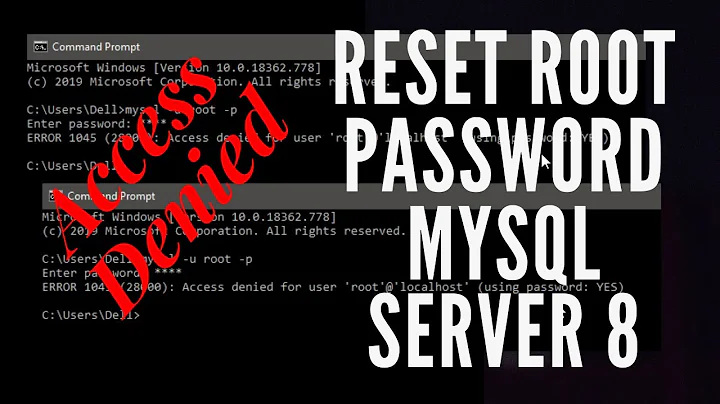Unable to Login as root after mysql service restart
11,351
May be you need to reset mysql root password:
Change my.cnf configuration file:
[mysqld]
skip-grant-tables
Restart service, and login with root without password, then change the root password:
SET PASSWORD FOR 'root'@'localhost' = PASSWORD('your_new_password');
Remove skip-grant-tables entry from my.cnf and restart mysql.
Related videos on Youtube
Author by
Andrew Atkinson
Updated on September 18, 2022Comments
-
Andrew Atkinson over 1 year
I installed mysql on Ubuntu 14.04 LTS like:
sudo apt-get install mysql-server libapache2-mod-auth-mysql php5-mysqlafter completely removing mysql with:
sudo apt-get remove --purge mysql-server mysql-client mysql-common sudo apt-get autoremove sudo apt-get autoclean sudo deluser mysql sudo rm -rf /var/lib/mysqlEverything works fine until I restart the mysql service with:
sudo service mysql restartThen I can no longer login with the root user and password. I get the error access denied for root@localhost using password yes
My only guess: is it possible there are two instances of mysql installed?
edit
All of the below are set as
installfrom the output of:dpkg --get-selections | grep -v deinstall | grep "mysql" libapache2-mod-auth-mysql libdbd-mysql-perl libmysqlclient18:amd64 libmysqlcppconn7 mysql-client-5.5 mysql-client-core-5.5 mysql-common mysql-server mysql-server-5.5 mysql-server-core-5.5 mysql-utilities mysql-workbench mysql-workbench-data php5-mysql python-mysql.connector-
steeldriver almost 10 yearsDid you follow the instructions to set a root password during the reinstall? if not, you can run
sudo dpkg-reconfigure mysql-server-5.5at any time to do so. -
Andrew Atkinson almost 10 yearsI was prompted to add a root password, which worked once it was installed before the restart.
-
 AzkerM almost 10 yearsPost the output for
AzkerM almost 10 yearsPost the output fordpkg --get-selections | grep -v deinstall | grep "mysql". Only possible way to see whether any other instance matching mysql. Meanwhile trymysql -u username -p& then type the password when it prompts. -
Andrew Atkinson almost 10 yearspost updated @AzkerM
-
-
Bombe over 9 yearsThis results in
ERROR 1290 (HY000): The MySQL server is running with the --skip-grant-tables option so it cannot execute this statementwith mysql 5.5.38. -
Ivan Cachicatari over 9 yearsIf you try with:
UPDATE mysql.user set password = PASSWORD('your_new_password') where user = 'root' and host = 'localhost' -
Jimbali about 7 yearsI had to be logged in as
rootand notubuntuwhen starting mysql. -
Jimbali about 7 yearsAlso I had to use:
update mysql.user set authentication_string=password('MyNewPass') where user='root'; -
Ivan Cachicatari about 7 yearsChange the
ubuntupassword using the same sql.




